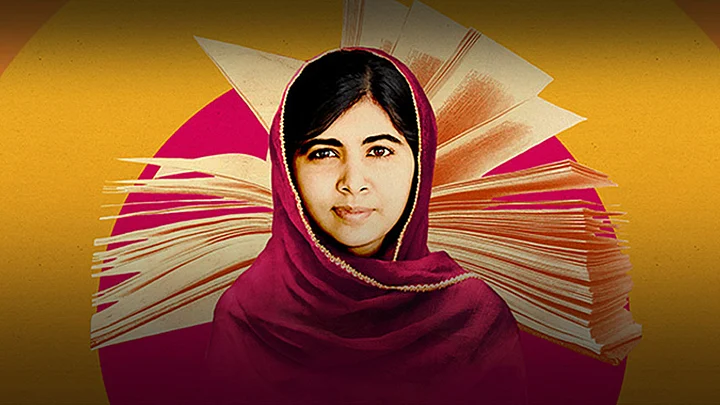Unless you count her admiration for Shahid Afridi and Roger Federer as significant revelations, Davis Guggenheim’s new documentary He Named Me Malala doesn’t tell us very much more than what’s widely known already about the Pakistani girl who was attacked by the Taliban in Swat Valley three years ago for daring to go to school.
What it does is confirm our perceptions of Malala Yousafzai – her incredible courage, steely resolve and remarkable self-assurance on the global stage. It also shines a spotlight on the bond between her and Ziauddin Yousafzai – the one who named her Malala after a Pashtun heroine – a father-daughter bond that dares you to stay dry-eyed.
After a limited showing at the Telluride Film Festival in Colorado earlier this month, He Named Me Malala is having what the much bigger Toronto International Film Festival calls an “International Premiere” on September 12.
The film shows Malala at home in Birmingham, England, as she, her parents and two younger brothers go about adjusting to life in a new country. Guggenheim, whose works include the Oscar-winning documentary An Inconvenient Truth, has said his aim was to showcase Malala’s family, and how their support has been key to her story.
“My first instinct in making this movie was that it is very much about a family, about a father’s love and about a girl who feels empowered to do amazing things. What inspires me is a mother who said it’s important that our daughter go to school. What inspires me is a daughter who saw her father speaking out and said ‘I want to do that too.’ The most extraordinary thing about Malala’s story is her family, their relationships and the choices they made in their lives,” Guggenheim said.
Her father’s influence is evident from the title; and indeed he is shown as her rock, leading by example, encouraging her and backing up her defiance of the Taliban. Her mother, who traded in her textbooks for a fistful of candy when she was five and missed out on an education because her family didn’t care to send her back to school, is supportive, but also the one worrying about their traditions, checking if their hijabs are in place and futilely advising Malala not to look men in the eye. Malala’s brothers are evidently like their ilk anywhere – by turns playful, loyal and tiresome.
Malala herself almost morphs into an ordinary schoolgirl, fretting about her grades at a new school that is tougher than the one back in Swat, intent on expanding her English vocabulary though she speaks the language quite fluently, and getting used to wearing a skirt to school – she notes that hers are longer than her schoolmates.
Guggenheim seems strangely set on getting Malala to talk about dating, but she demurs without seeming defensive or wistful. But even at her most playful, it’s difficult to lose sight of this teenager’s quiet dignity, complete lack of bitterness and fervent advocacy of girls’ education.
This contrasts starkly with the hellish agenda of her tormentors whose charming messages include: “God willing, this will never end,” and “My own life doesn’t matter to me, what do I care about yours?”
The film, based on I Am Malala, the book that Malala co-authored with Christina Lamb, cuts somewhat confusingly between her current life in England and travels overseas – to conferences in the United States, a school in Kenya, meeting the heartbroken parents of the Nigerian schoolgirls kidnapped by Boko Haram, and Syrian refugees, among others. Her past life in Swat is told through animated sequences and news footage of terrorist attacks, including the one on her school bus.
Guggenheim doesn’t shy away from talking to some Pakistanis who dismiss Malala as a Western puppet or as an overrated activist, but he doesn’t refute their claims. The paralysed left side of Malala’s face should be rebuttal enough.
Malala is not traveling to attend screenings of the film, even though Cameron Bailey, Artistic Director of TIFF, says they tried to arrange a visit to Toronto.
She has both a very rigorous security protocol around any of her movements as you can imagine, she’s had very serious threats made against her life, but more importantly she’s in school. She makes that a priority.
– Cameron Bailey, Artistic Director of TIFF
The producers of He Named Me Malala, Walter Parkes and Laurie MacDonald, actually set out to make a feature film based on Malala’s life. But that changed after they met her in Birmingham. “Laurie and I came away from our first meeting feeling that no actor could possibly portray Malala,” recalls Parkes.
They decided it would be best to let Malala tell her own story. And what a story: she has survived an assassination attempt, shaken hands with the Queen of England, been invited to the Oval Office, shared a red carpet with Bono and spoken to countless leaders and inspired school children around the world, and she’s only now eighteen. What’s left, the Nobel Peace Prize? Oh, wait.
(Indira Kannan is a senior journalist currently in Toronto covering the international film festival, TIFF 2015)
(At The Quint, we question everything. Play an active role in shaping our journalism by becoming a member today.)
